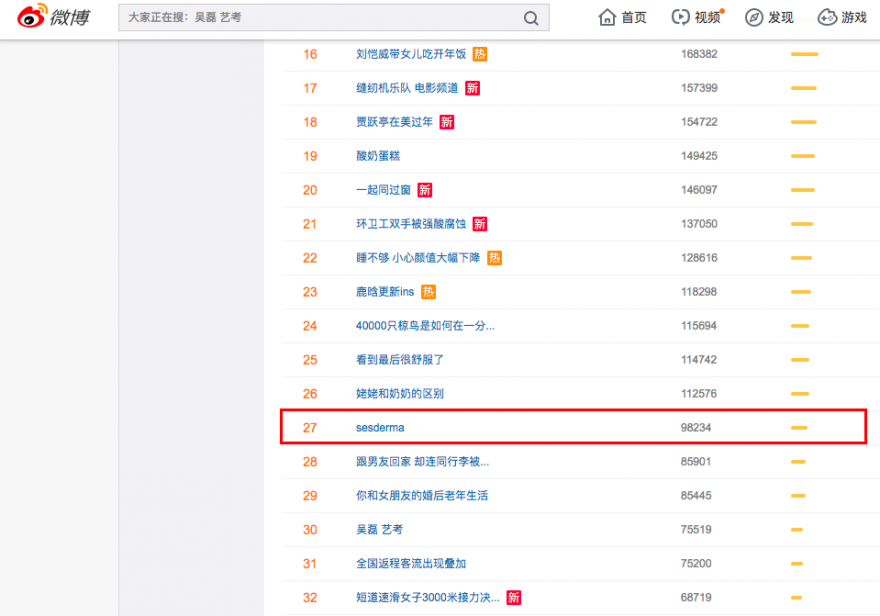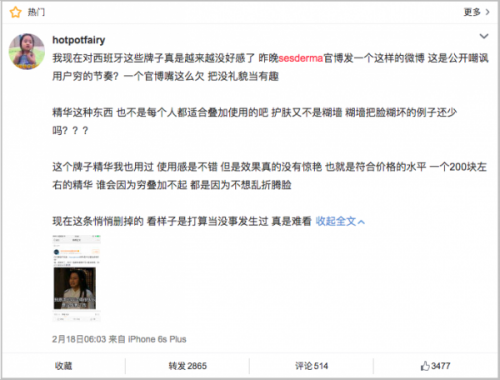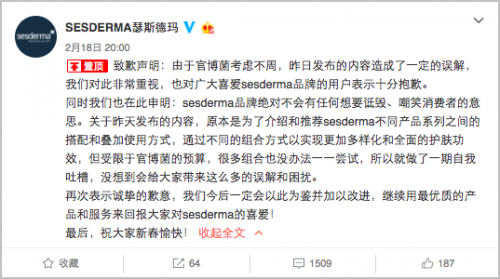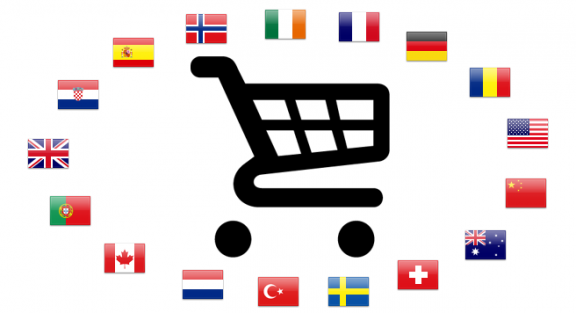Weibo social media crisis learning from Sesderma in China
With almost 400 million monthly active users by the end of 2017 on Weibo, without a doubt, every foreigner brand would consider Weibo as an important social media channel to build up awareness in China. We can imagine if one brand could appear on the top search topics, it may be because they have successfully created a big issue, but on the other hand, the popularity maybe also comes from unexpected negative feedbacks which a small issue could turn into a serious PR disaster in the blink.
We can always learn from other’s case and prepare tailored social media crisis management for our own brand in advance, and this time we learn from Sesderma’s experience.
Sesderma hit No.27 on the Weibo top search topics

On the daily social media monitoring, we found that Sesderma, the well-known Spanish dermocosmetics brand was on the hot search list on Weibo, but they were dealing with the crisis out of a careless mistake in China. Their account has more than 7,000 fans, but the brand name search volume was 14 times more, we can assume the negative news brought in lots of people who aren’t familiar with the brand Sesderma before. What caused the PR crisis exactly? Let’s get back to where the issue started.

2/17 12 pm: Sesderma’s controversial post
Their intention was to educate the fans how to apply their product for a better result and created the post in a soft and self-deprecating way, but the critical part is they said “you” are poor and “you” don’t have money, so they misled the perspective and turned out to discriminate against the fans. Unfortunately, since then, the post started to accumulate passive comments in a quick-speed.

2/18 6 am: One user posted the negative feedback about Sesderma’s post (share:2,865 / comments:514 / likes:3,477)Not only the improper content, but the way Sesderma managed the issue. The user found Sesderma directly deleted the original post and without responding to fans’ anger. The post just went viral afterward, and it easily pushed Sesderma on the hot search list on Weibo.

2/18 8 pm: Sesderma apologized sincerely to their fans
After waiting for more than one day, Sesderma had an official post to apology for their careless mistake. According to the comments, most of the fans could accept and left their support notes, but Sesderma continued to occupy the hot search topic position, until late afternoon on 2/20. Social media crisis comes easily, but it’s definitely hard to disappear.
3 takeaway to prepare crisis management on social media in China
1/Respond timely and as long as the mistake is confirmed, a sincere apology and open communication is needed
In many cases, actually, the crises are avoidable, if we can manage the potential crisis timely, and organize the crisis management team if necessary with members from involved departments, to create a open dialogue with fans within 24 horas.
2/Self-deprecating humor is easily taking over on social media, but extra care and attention for this kind of content is crucial
Sometimes self-deprecating humor is delicate, it’s better the content can be viewed and checked by different people to taste the respond. And keep the first person perspective clearly through whole content, as we can see in the Sesderma’s case, as long as you change the perspective, self-deprecating post could backfire quickly.
3/Chinese local team represents the foreign brand in China, so it’s important to work closely with headquarter to deliver the brand value
Even though many foreign brands have local subsidiary or agency to execute all the Chinese market marketing communications in China, but work integrally and have regular meeting is essential to keep both parts on the same track towards the ultimate success.
If you are interested in developing business in China through online marketing and e-commerce, 2 Open are glad to listen to you, please feel free to contact us by e-mail: INFO@2OPEN.BIZ, or just leave us a message below, we will get back to you as soon as possible.
Olive oil from Spain directly sold and shipped to China consumers (Tmall Global)
After the grand opening of Correos cross-border shop on Tmall global in June, our team did a purchase and tested the shopping experience. Here, we will share what is it like to purchase in Correos cross-border shop:
First of all, the brands sold in Correos shop are mainly famous local Spanish brands and have not registered in China yet. Therefore, these brands joined together and sell to Chinese customers in this novel model.
After searching in this shop for a while, we decided to purchase a box of olive oil as Spanish olive oil is known with high quality and good taste.
 Then, we started chatting with the customer service to ask for more details of this product. The shop sales replied us immediately. He told us the Correos cross-border shop has a local office in Hangzhou, China, however, all the products are in Spain and will be shipped directly from Spain to China. He also told us that lead time is within 3 days and the delivery time is around 7-14 days depending on various factors such as weather, traffic etc.
Then, we started chatting with the customer service to ask for more details of this product. The shop sales replied us immediately. He told us the Correos cross-border shop has a local office in Hangzhou, China, however, all the products are in Spain and will be shipped directly from Spain to China. He also told us that lead time is within 3 days and the delivery time is around 7-14 days depending on various factors such as weather, traffic etc.
After all, we still decided to purchase this product and decided to pay and check out. There is personal cross-border purchase quota. We advise you to check it in here http://ceb2pub.chinaport.gov.cn/limit/outIndex before you make any purchases. Then, the buyer required us to submit a scanned copy of our ID, which will be used in the customs to clear the goods at the border.
Due to the long shipping distance, the shop does not take return merchandise. For testing, we finished payment and received a tracking number, which we can use to track our package online. For our order, we found out that the lead time is 2 days. After more than one week’s waiting, we finally received our olive oil 10 days after departure. Compared to our previous shopping experience on Tmall domestic, it feels slow but still within the time range they promised.
 Unfortunately, our products exterior package is a little bit deformed probably due to the cushion put inside the package box is not enough. We sent a complaint to the customer service of Correos cross-border shop immediately.They were also sorry for this and decided to compensate 20 RMB to us.
Unfortunately, our products exterior package is a little bit deformed probably due to the cushion put inside the package box is not enough. We sent a complaint to the customer service of Correos cross-border shop immediately.They were also sorry for this and decided to compensate 20 RMB to us.
In general, we have a very satisfying purchase experience on Correos shop on Tmall global except for the relatively long waiting time.
New Trends of Chinese Consumers
After being awakened by the influence of the western modern lifestyle, and the material richness, the Chinese consumers have more confidence now. The Chinese consumers’ patterns and consumption behavior are changing significantly these year. Let’s check around the new trend of Chinese consumers.
- To be distinctive / unique
Cenozoic consumers are not satisfied with popular brands only. They are looking for more customized / personalized products to make themselves look different and unique. That’s why the special-interest brands are growing rapidly recently. These brands usually have their creative products which meets the unique demand of specific consumers. More importantly, these brands help consumers to realize their dream of being distinctive and unique.


- To express, to share, to transmit
Chinese consumers have strong will to share (no matter it is their selfies, or daily life update, or the products they purchased) especially on Social Media which is a manifestation of self consciousness. Various Social Media platforms provide Chinese consumers with a channel to showcase their lifestyles, taste and opinions. Behind the motivation of showing their unique opinion or taste, there is a purpose to gain the social identity as well.
[logos]

[/logos]
- Increasing attention and concern about health
Chinese consumers concern a lot about “Eating”. The attention and concern about “Healthy Food” is keeping increasing these years, such as water, juice, diary products. Consumers’ awareness of health is growing and they are willing to pay for the healthy food with good quality. Therefore, in order to cater to the consumers’ demand, more and more brands upgrade their products and adding the “Healthy” concept as much as possible.


- Convenience is the king
“No time” has been the pain of today’s consumers. They are too busy to struggle between workplace and home. Today’s consumers are willing to spend money to get themselves free from those boring, repetitive daily activities. The numerous door-to-door services have spoiled most consumers by eliminating the time and troubles and increasing the convenience.


- Cross-border Shopping
Chinese consumers are now turned out to be global shoppers. As Chinese government launches more policies and regulations of Cross-border e-commerce, the picture of it has been more clear now. Besides the luxury products, the electronics household appliances, mother and baby products, and other daily necessities have been listed on Chinese consumers’ shopping list now.

How to Target Clusters to Sell in China?
When talking about selling in China, the Chinese regional polarization becomes a relevant frame of reference. How to deal with such a vast country which could be considered a continent in itself?
In any process of business development in the Chinese territory, companies face the same fundamental problem. Even if there is not a single answer, these three below are constantly repeated.
First, the Company lacks totally of any real knowledge about China. Intuition is not a pray and you would be wrong.
Doing business in China by making a North-South East-West division is not useful, neither the best solution. Split the territory geographically will drive you towards more inaccuracies. To give you an idea, Guangzhou and Shenzhen belong both the south but they barely share any similarity.
Guangzhou is traditional Cantonese speaking city with a strong rooted culture. Meanwhile, Shenzen is more cosmopolitan mandarin speaking city populated in its vast majority by immigrants from all over the country and overseas. There is a Chinese common say about Shenzhen, “Once you get to Shenzhen, you become <<Shenzhenese>>”.
Secondly, once we realized that geographical distribution might not be the best option dividing by tiers could seem quite reasonable.
As you probably already know, in China cities are classified in 5 ranges, from Tier 1 to Tier 5, so dividing by tiers is again a mistake.
The example just exposed would serve also as explanation. Another example would be Beijing and Shanghai. Both belong to Tier 1 cities; nonetheless there is no possible comparison between Beijing and Shanghai, despite of the fact that both are super cold in the winter, although they tried to sell us that Shanghai belongs to the south…!
Beijing, capital of the People’s Republic of China, has been the capital of the country for much of the past eight centuries. Beijing is the cultural and political core of the Chinese nation. Tradition is venerated and could be observed in every place of the city.
Shanghai on the other hand, is the largest city in the world and the financial center of China. Luxury, skyscrapers and mix of cultures are some of the characteristics of the city. In Shanghai is common to find a huge number of expats and western style neighbors due to existence of the old French concession. So, there is no point to focus on city size.
Third and yes, Chinese people share several distinctive characteristics which are markedly different from any other culture, but Chinese are still Earthmen.
So please, do not fall into generalizations but neither forget a main description of the modern Chinese consumer:
- First, the Chinese remain best disciplined savers. The Chinese saving is not only driven by culture but also due to its lack of a real social care system
- Second, the Chinese are not loyal to brands, and they love experimenting trends, products and services
- Third, Chinese are savvy consumers, based on the price variable
- Fourth, Chinese shoppers have begun to understand the gap between price and value
Therefore, which would the best way to segment China?
Recently, Mckinsey studied which would be the best way to segment China into reasonable pieces. After reviewing many indicators, experts concluded that it was reasonable to cluster the Chinese territory.

It is helpful to focus on cluster size and much more effective. China is huge and Cities can be very far from one to another, so you better bear in mind that distance is a key point when doing business. We also must add that areas can be much attractive to business than cities, due to its bigger GDP and incomes, larger population and better facilities.
In the meantime, take a look beyond historical growth rates can help you to extrapolate future trends and discover if your product or service is going to last. Remember Clusters share trends and determine their evolving. For example, milk was slowly introduced in the country, first in the Shanghai area, to gradually spread.
Landing in China is never easy
In 2 Open we hope you enjoyed the reading but especially, that these tips have helped you know better the Chinese business reality.
Keep in mind that it would be much better if your arrival occurs by the hand of a consulting agency specializing in Chinese business, Ecommerce and Digital Marketing.
Need help to sell online in China?
This article was edited by Paula Vicuña from 2 Open.
Sources:
Alibaba Overcomes Baidu in Chinese Digital Advertising
According to a new report from eMarketer, experts predict that the decline of Baidu in favor to Alibaba is due to the new market conditions in Chinese digital business. Alibaba has adapted fast to the last digital ads regulation and currently enjoys the leadership in terms of online advertising revenue.
The Chinese Internet landscape is characterized by the huge prominence of the three technology giants.

As you may know, Baidu is the largest player in China in digital advertising market, Alibaba is the Chinese eCommerce leader firm and alongside both, plays Tencent.
These Top 3 in digital industry are estimated to command a total of 60% in ad revenue in the present year, and amount around $42 billion.
What factors have led Baidu to its future decline?
Although currently Baidu still controls the largest share of the online advertising market, the success of the company in 2015 is far from repetition. Baidu’s share in China’s digital ad market is expected to drop to 21% in 2016, and forecasts are less positive for the coming year.
In early September, in the team we analyzed in our article “New Online Advertising Rules in China” the new online advertising regulation in China and its impact in all digital business with presence in China.
The Internet Ad Interim Measures is a new regulation prompted by the State Administration for Industry and Commerce of China. It arose from the Government’s claim by adopt new rules over online advertisement, at the time it was expected to impact on Chinese Digital Marketing as a whole.
As we mentioned before, some fields were subject to special regulation: healthcare, medicine, food and beverage. But new regulations also affect to Internet advertising practices with some other measures: it is required that all paid ads to be clearly marks in search results, prescription medication and tobacco ads have been forbidden and it is already mandatory to certain medical and health products.
From the beginning, these changes were identified by outside analysts as a serious handicap for the future of the company. As Shelleen Shum told,
“We think the impact will be larger on Baidu than on the other search engines given Baidu’s larger market share and its dominance in medical service ads.”

But the coming into force of the new rules, is not the only reason for its current decline. The lack of strong mobile devices is also affecting its ability to attract advertisers.
The main driver in the Chinese market is the mobile platform. As Lyu Ronghui said,
“Huge traffic is the bedrock of online advertising business. But unlike Alibaba and Tencent, which have numerous successful mobile products that can attract traffic from users. Baidu still lacks a new cutting-edge to help jumpstart its slowing traditional search business.”
Facing Baidu, Alibaba has surpassed its rivals taken advantage of the new conditions. As Shelleen Shum explains, its reinforcement is due to,
“Although also affected by the new regulations, Alibaba’s ad revenue, particularly from the mobile sector, shows no sign of abating thanks to the robust growth of its e-commerce retail business.”
Although at present Baidu controls 28% of the online ads marketing, Alibaba is expected to become the largest player in China’s digital advertising market before finishing 2016.
New rules in China
In China, digital landscape changes as faster than imaginable. There are plenty of creative ways to sell your services and products in China, but acting in the hand of a company based in the country, is always a big extra bonus for your business in China.
In search of a Digital Marketing & Ecommerce Agency?
Sources:
Europe and China Partner to Provide Mobile Payment Solutions by Alipay
Not quite a month we woke up with the news that two technological giants had joined forces in creating an alliance with huge chance of success. The alliance between Ingenico Group and Alipay is focused on payments innovation as part of a wider international push, but is also a recent demonstration of the growing momentum of Chinese companies in Europe.
Over recent years, Chinese ambitions in Europe are clearly visible: just in 2016, Alipay has forged alliances with Uber app and Wirecard to offer mobile payments services around the World.
The alliance is based in European mobile payments
Ingenico Group is a french company specialized in designing a wide range of payment solutions, whatever the sales channel or payment method is chosen, according to three main needs that merchants and consumer ask: a secure, easy and seamless experience.
In recent years, China has created a vast and well integrated digital ecosystem in which highlights Alipay– a Chinese equivalent to PayPallaunch by Alibaba– which is already China’s leading third-party online payment solution with no transaction fees. The company already has more than 400,000,000 active Users.
 Although there are many reasons behind this alliance, the clear purpose was to tap into the huge Chinese tourist flow in Europe. As we wrote in our previous article “How to Acquire Chinese Tourists through Digital Marketing“, the Chinese tourism consumption is already estimated to be the highest in the World. Moreover, Chinese tourism market will keep growing even faster: in year 2019, estimations says that consumption will reach US 264 billion dollars.
Although there are many reasons behind this alliance, the clear purpose was to tap into the huge Chinese tourist flow in Europe. As we wrote in our previous article “How to Acquire Chinese Tourists through Digital Marketing“, the Chinese tourism consumption is already estimated to be the highest in the World. Moreover, Chinese tourism market will keep growing even faster: in year 2019, estimations says that consumption will reach US 264 billion dollars.
The motivation to exploit the partnership is shared: on the one hand, Europe has become the major vacation destination by a sector of the population with high standard of living; on the other hand, Alipay seeks to exploit the existence of more than 120 million Chinese tourists arriving in Europe every year and an approximately cost of $ 875 on average, while offering a payment experience nearest to their day to day.
Chinese tourists in Europe will be able to pay via Alipay App at any store that uses the Ingenico solution
The announcement not only underscores the growing relationship in business between two increasingly interconnected areas, but also the enormous benefits that such collaboration can mean to both. With such a perspective, it is not surprising the happy ending. As Philippe Lazare, Chief Executive Officer of Ingenico Group said,
“We are very excited to partner with Alipay and contribute our unique omni-channel expertise, products and services to help them optimize the user experience and boost sales all over the world. Their choice for Ingenico is a tribute to our high success rate and ability to meet even the most demanding customers’ requirements.”
 Chinese tourists are accustomed to using electronic payment methods, an innovation that fails to catch on among European citizens. Presumably, this cultural difference has become a barrier that discourages expenditure among Chinese tourists. As Jacques Behr, Ingenico’s executive vice-president for Europe and Africa said,
Chinese tourists are accustomed to using electronic payment methods, an innovation that fails to catch on among European citizens. Presumably, this cultural difference has become a barrier that discourages expenditure among Chinese tourists. As Jacques Behr, Ingenico’s executive vice-president for Europe and Africa said,
“Payment becomes a friction for business so we are removing this friction by allowing the retailers to capture sales to the Chinese tourist population.”
The measure therefore seeks to stimulate Chinese people expenditure in their major holiday destination, but also tries to take advantage of the huge market Alipay already has in China: more than 450 million users liable to become target audience, and a market share in mobile payments in China higher than 80%. As they themselves spelled out,
“We are building international business step by step. There is much still to do with our customer base, and is still expanding.”
Such collaboration not only benefits the Chinese people, but also means a qualitative leap in technological enjoyment for Europeans. The alliance seeks to provide to European online retailers and to customers the possibility to pay and accept payments through Alipay´s eWallet through some marketplaces. An excellent way to boost e-commerce and sales in China and Europe.
Although the operation has already begun, both companies estimate that Alipay won’t be fully operational in Europe yet.
Just to start
While Alipay makes its movements, the rest of the world watches. Only companies that have a deep understanding of Chinese market can cope with the changes that are to come.
In search of accurate and personalized information to your sector and business?
Visit our Digital Marketing and eCommerce Agency!
Sources:
China And The Ripple Effect On The Global Stage
What are the risks that could arise from the economic slowdown in China? How does China affect to other countries? Since starting its market reforms almost thirty years ago, China´s currently economy cannot be ignored.
Even if China has not left behind its centrally-planned economy yet, it has introduced some big measures to turn into a market-based country. Such efforts have resulted in a huge GDP growth and has lead the country to reach all the Millennium Development Goals by 2015.
Currently China has become the second largest economy in the world, but deals the first in the ranking by the quantity of goods and services produced. Moreover, according to the expectations published by the International Monetary Fund (IMF) for the present year, China will be responsible of the 18% of the entire World economic activity.
If to all this we add the expectations of its huge and richer population, its rapid change on production models and its consequent role on the World stage, we can conclude that the importance of China in the world has become a matter of vital importance in today’s global interregional balance.
But its big hits cannot make us forget that China still remains a developing country, and as we have mentioned before on our article “Ten Challenges on Chinese Future“, not only market reforms are incomplete, but also it has huge challenges ahead which must start to face.
After the financial crisis of 2008, neither the business community nor Governments have fully restored their confidence on the global economy. The doubts about the economic bonanza and the future role of Western countries have underestimated the increasing influence capacity of China in the international arena, while doubts have generated certain fear of a possible blowout of the country.

Trade effects are a game changer
The channels through which China affects the global economy can be summarized on:
- Decrease in trade and exchange rates
The Chinese leadership on trade makes hard not to affect global demand. China’s import volumes keep growing, but less than expected. This becomes a huge problem to those countries dependent on Chinese exports: raw materials are highly susceptible of the slowdown.

This effect creates a bidirectional paradox: China affects the world as much as the world affects China.
Although there has been much speculation about a possible future depreciation of the RMB in order to relaunch Chinese exports, in the team we believe that a currency war is currently off the table.
- Oil lower prices and commodities
The latest drops in oil prices are caused by the lack of confidence on Chinese economy. Its weakness has led to enormous imbalances on exporting countries of crude oil and raw materials: Russia, Brazil, OPEC countries and the U.S. still suffer for it. China’s falling demand has greatly contributed to the new situation and with it, deflation has knocked on the door.

However, according to the latest analysis made by the IMF, the negative effects are supplemented by growth in the purchasing power of the population. The Organization still thinks that lower prices on commodities have a positive effect on general economy.
- Monetary and inflation policies
The recent affordability of RMB should not make us forget that Chinese weakness can lead to a global new paradigm surrounded by deflation and debt. Once again, lower prices stimulate consumption, and this leads to boost demand, bigger sales and prosperity. Lower prices have become the stimulus of global economy.

- Cultural hegemony
Even if the Western countries have underestimated China’s rise, the consequences can already be seen. Although Cultural power follows to Economy and Politics, China already shows its increasing political and cultural power on international arena: mandarin language and Chinese diplomacy have become a key to Government policy.

Its empowerment is more visible in East Asia, but runs fast around the rest of the world. We have started living in a China-centrism, in which global power gravitates around Chinese policy.
Nowadays, confidence in the global economy is vital for prosperity but unpredictable. The ripple effect that is lived in the global area, is greater than ever.
Understand this huge spider web which is China, seize opportunities to launch your business and boost your sales, are our goals.
In search of a Digital Marketing Consultancy? Interested on Chinese Ecommerce?
Visit us on 2 Open. We would love to hear from you!
10 Challenges On Chinese Future
Any approach to Chinese landscape ends falling into the same debate: Will China evolve or break over the next years?
Although experts do not agree (And neither do we!), in the team we believe it is important to name some of the most immediate challenges ahead for China.
Current challenges are also the challenges of the future
When we talk about China, no one agrees. The huge boost experienced by China in the last thirty years has not buried the doomsayers who year after year have sown doubts about the future of China. Faced with them there are some enthusiasts who proclaim that the next world leadership belongs to China. Who has the reason? Not everything is white, not everything is black. Both sides are right.

Reforms, Where to start? Ten points to keep in mind
China is characterized by the dynamism that has developed in recent years. In order to ensure the future growth of the country, Chinese authorities must address some issues of particular importance:
First, Local Government Debt:
Local and regional government debt have been a terrible headache for analysts. We would like to underline the explanation Nicholas Zhu, senior analyst at Moody’s, gave,
“For the local government direct debt, we believe the government is finding a handle by capping it at 16 trillion yuan ($2.45 trillion) overall and improving the structure by swapping some existing debt into bonds at lower cost and longer maturity.”
However, in recent times the central bank started to allow qualified individual investors to buy and sell the bonds through commercial banks.
Second, Reform State Companies:
The Government is attempting to reform the state-owned sector while continuing to maintain its currently control. To do this, some different attempts have been made, such as: mixed formulas, restructuring, mergers, open up protected service sectors to private and foreigners, them all focused on enhancing their competitiveness and autonomy on private-sector markets.
Third, Liberalize the Financial Sector:
Financial liberalization is a key in Chinese reform, and it is closely linked to the privatization phenomenon itself. Both reforms will be needed to maintain Chinese growth, and facilitate the creation of jobs and the reliably channels credit to companies. The success of economic reforms carried out, will be a determining point of stabilization or social destabilization, and are a sensitive issue in governmental action. As the country opens its doors further, as the former Australian ambassador to China, Geoff Raby said,
“Equally China will be more open to capital inflows.”
Fourth, Investment:
Investment in China is drived by Foreign Direct Investment, as a key which gives advantages to the supplier and also to the host. Moreover, is a thermometer of the future of the business, and China has already started to capitalize its benefits. At the same time, FDI depends on some key – factors:
- Capital Availability: China is already the world’s largest recipient of foreign capital.
- Competitiveness: Rests on the country’s capacity to develop its infrastructure, resource availability, productivity and workforce skills.
- Regulatory environment: A difficult legal doctrine and excessive regulation, have been a serious handicap for investment in China. Things are changing, but it is still far to be as it should be.
- Openness to trade –especially international one.
Fifth, Deflation:
To achieve the Chinese structural goals, it is a necessary condition that the country’s growth rate is maintained over 5 years above 6.5%. Moreover, in China Dollar strength prevents avoid closing 2016 with deflation, and has contributed to high capital outflows in recent years.
Sixth, Chinese Demand for Hard Commodities:
A very important point to consider for countries that produce raw materials as iron, copper or aluminum. Its prices will drop sharply as long as its demand will go slower. This expectation is opposed to food, which will keep increasing due to the growth of Chinese middle class.
Seventh, Manufacturing:
China´s export competitiveness are based on three main principles: low unit – labour costs and interested rated, and an undervalued yuan. Due to the paradigm shift, it is expected that China’s strength at this point has begun to crack; an opportunity for others countries after all!
Eighth, Innovation:
Over the past five years, China has promoted with great vehemence its innovative sector. The technical, economic and human development are impressive, especially its efforts in Science & Technological graduates. According to Mckingsey Global Institute,
“China must generate two to three percentage points of annual GDP growth through innovation, broadly defined. If it does, innovation could contribute much of the $3 trillion to $5 trillion a year to GDP by 2025.”
Nineth, Environment:
China lives in a permanent Environmental crises: air and water pollution, deforestation and desertification, biodiversity, high rates of cancer and the growth of a middle-class who is adopting a Western –style consumer patterns have become a huge problem for future. China needs to change the course of its current model. Therefore, he has embraced renewable energy.
Tenth, Consumption:
We cannot talk about Environment without mention Consumption. The sharp increase of in domestic consumer patterns and the Chinese middle-class prosperity, will need of a sustainable and growing consumer economy based on the need of big service sector reforms.

Companies must be ready. How to be competitive in China?
The rapid evolution of the world stage precludes long-term estimates. Having an updated database and the example of a specialized agency, is always a clear advantage in any approach to the market, but even more in China. It has never been enough for global business to know what is coming, but also knowing how to take advantage of every opportunity that arises in the market.
In search of a specialist Agency in the Chinese environment? Are you interested on Digital Marketing and Ecommerce?
New Online Advertising Rules in China
New online advertising regulation in China will impact all digital business with presence in China. Here we bring you an analysis overview to start adapting to the new trend in advertisement.
It would be after the death of a college student who took part in an experimental health treatment found in Baidu, when popular pressure would force the Government to begin an ads regulatory change.
The Internet Ad Interim Measures, a new regulation prompted by the State Administration for Industry and Commerce of China, went into effect in September 1st. Therefore, it arises from the Government’s claim by adopt new rules over online advertisement: email, paid searches, embedded links, images, and videos are already subject to the new law. Its aim is avoiding the spread of misleading advertisements on the Net, and correct the prevailing liberality so far.
The new online advertising regulations are expected to impact on Chinese Digital Marketing as a whole: social media, search engines, apps and electronic commerce in the country will have to move under the new guidelines.
A step closer to the uses and customs in Western advertisements
For the first time in China, the new measure features a specific definition of Internet advertising; often, foreigners suffer from a lack of legislative safety in China. Therefore, conceptualization is a step forward to define clearly not only the concept, but also its extension:
“Internet advertising is advertisements that directly or indirectly sell commercial goods or services through the websites, web pages, internet applications and other forms of Internet media including text, images, audio, video and etc.”
Moreover, the regulation comes to underline its main purpose:
“To protect the legitimate rights and interests of consumers, and promote the healthy development of the Internet advertising industry.”

In what fields are these changes applicable? What changes will take place after its implementation?
The regulation is particularly focused on a list of fields described below:
-Healthcare and medicine
-Food and beverage
The main measures to be starting to apply can be summarized as:
–First, the Law requires to place the word “advertisement” in a prominent position and clearly distinguishable at first sight.
–Second, every field subject of special regulation needs a previous review and an approval process by authorities.
–Third, online advertisements for prescription medicine is banned. A special measure in health products is also extended to medicines, pesticides or medical supplies.
–Fourth, tobacco online ads are also banned.
–Fifth, any paid search results, links or content must be clearly identified by the word “advertisement”.
–Sixth, users should not only have the choice to close an ad, but also this has to be easy to them.
–Seventh, paid links and contents must be clearly detailed at a glance.
–Eighth, any attached ad and/or promotional links to an email should have been allowed previously.
–Ninth, any misleading and/or false ad is considered illegal from now on.
Who is especially affected by the new regulation?
Under this measure, the biggest impact falls on the largest Internet companies in China. Baidu and Bing should apply new restrictions on ads; it should not be forgotten that, much of the incomes of Baidu, Weibo or Alibaba come advertising.

But also traditional Social Media must change. WeChat or Weibo offer paid content; as we mention before, pop-ups, ads or links should be first permitted, which will force companies to evolve the way advertising is offered to Chinese users. Seems marketers should start creating better ads, or contravening the prevailing legislation with all the penalties that that means.
There are plenty of creative ways to sell your services and products in China. In search of a Digital Marketing Agency?











